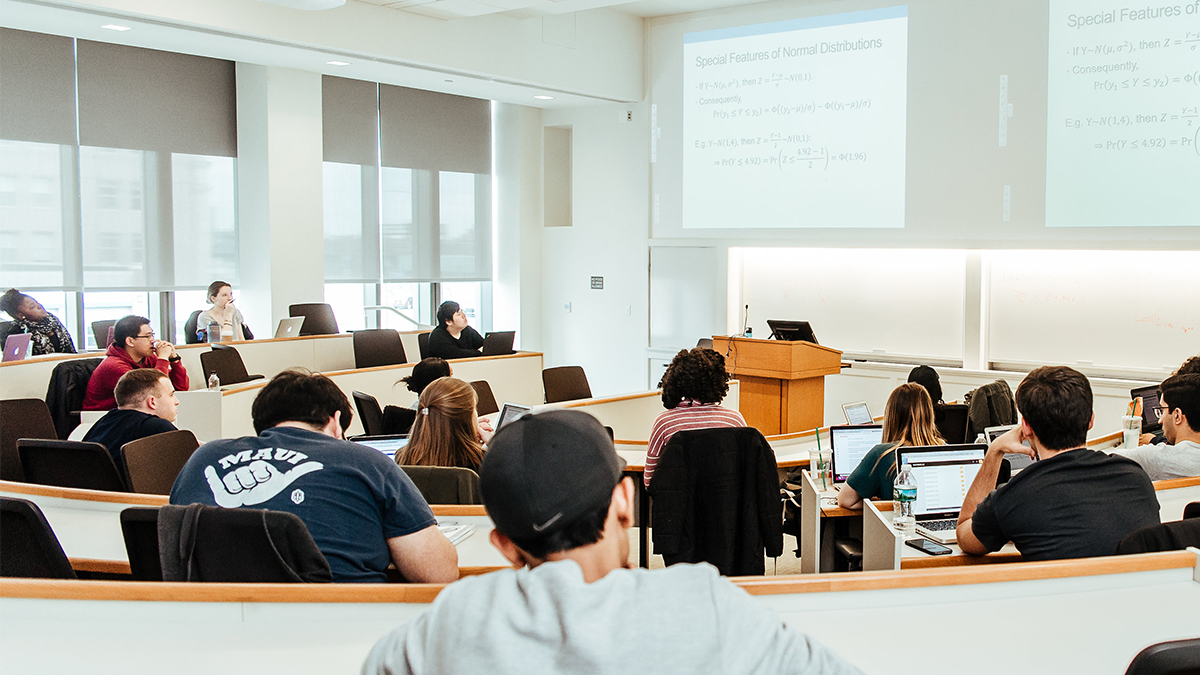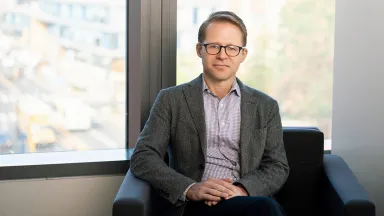
Using Real-World Data Provides an Eye-Opening Introduction to Economics
A “flipped” classroom model. Lab sessions where students experiment with real data. Online collaboration and discussion between classes. Just how many innovations can one class contain?
Using Big Data to Solve Economic and Social Problems (ECON 270), taught by Professor of Economics Andre Kurmann, PhD, is a forward-thinking class that encompasses big-picture ideas, and Kurmann’s inventive approach to instruction and his willingness to make adaptations have earned him LeBow’s Innovation in Teaching award for spring term 2024.
Kurmann modeled his course on one taught by economist Raj Chetty, William A. Ackman Professor of Public Economics at Harvard University, and the School of Economics has made it open to all majors within LeBow and to students in other colleges at Drexel without any prerequisite economics course.
After first offering the course in 2022 and during each winter and spring term since, Kurmann has adapted the course to incorporate feedback from students and introduce topics from some of his research areas. In addition to the Innovation in Teaching Award from LeBow, Kurmann has also received the Provost Award for Pedagogical Innovation for his approach to the Big Data course.
“Where innovation has really happened is in fine-tuning the lab part, which is a unique feature among classes here in economics and in LeBow,” he says.
The lab, led by undergraduate teaching assistants, puts students from various majors ranging from first- through fifth-years, to use statistical methods and software to conduct analysis on real-world big data.
That unique experience, combined with exposure to current economic trends and topics, feeds into lively discussions during class sessions and between classes on the Yellowdig platform. It has also spurred some students to declare majors or minors in economics or other related fields and prompted others to serve as teaching assistants for future class sessions.
Kurmann notes that certain class topics have continued to resonate with students: notably, looking at income levels of students at top private universities, including Drexel, to show how higher education in the United States is still highly segregated by income.
“Drexel has really good outcomes in terms of earnings potential, and the students can see that, in some ways, Drexel is a really good place but it’s also a really unequal place, because it attracts only a very small share of students from low-income backgrounds,” he says.
Students also look beyond the familiar college environment in using data at the Census-tract level on incomes to predict where individuals might have the greatest likelihood at escaping poverty and attaining upward social mobility. Whether they plug in the address of their off-campus apartments or their parents’ homes, they’re often surprised by what they discover.
Kurmann sought to build on these findings by bringing in representatives from the Anderson Monarchs, a youth-sports organization based in South Philadelphia, to explain their work in the social-impact space through forming teams that have a deliberate mix of youth athletes from varied economic and social backgrounds.
“The Monarchs are one organization that tries to reduce some of these barriers by deliberately mixing students from different backgrounds,” he says. “They came to class and presented their model, and the students were asking questions nonstop and saying that they want to volunteer.”
From this point, the real-world impact of the class continued to grow. Students from the Drexel Chess Club began weekly sessions with Anderson Monarchs players, leading chess lessons and playing matches with younger students.
Ella DeSimone, BS economics and business ‘27, reflected that the discussions of healthcare in the class was one of the most valuable topics she’s learned at Drexel.
“ECON 270 demonstrated how economics can be used to understand income and health disparities in the United States,” she says. “Going into the class, I thought I understood many of the systemic issues in the United States, but this really awakened me to the depths of these disparities.”



